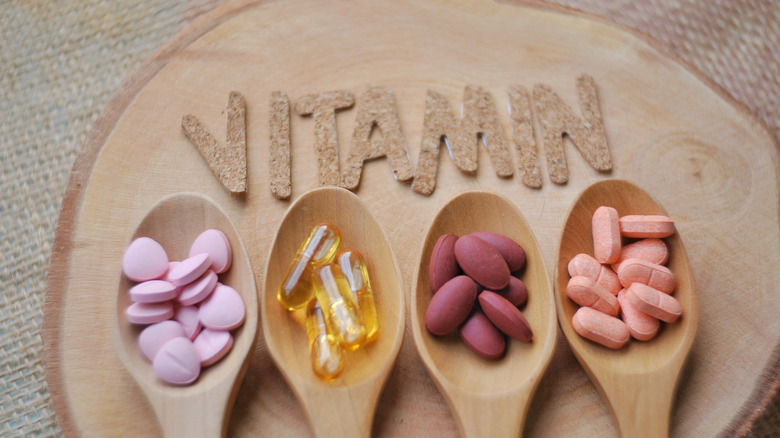The Vitamins You Need If You Have Dandruff
Here it is — that dreaded moment late in the day when you realize there are white flakes on the shoulders of your black shirt. This situation is a common one that you or someone you know might have experience with. Dandruff can sneak up on you overnight, or perhaps be an ongoing nuisance, and most living with the condition will agree that it can be tough to manage.
Dandruff is a mild form of seborrheic dermatitis, a condition that affects oily parts of the skin such as the scalp and causes shedding, redness, and itching (via Mayo Clinic). Principal Scientist at Head & Shoulders, Dr. Rolanda Wilkerson, shares with Glamour that half of the population is genetically predisposed to having dry scalp or dandruff, and, if left untreated, the condition can have a negative impact on hair as well. Aside from your DNA, there are other factors that can contribute to your scalp woes. Healthline reports that there is an association between dandruff and diet.
These nutrients may help with dandruff
According to Healthline, dandruff may be present if your body is low in certain essential nutrients, perhaps due to lack of consumption or absorption issues. In a 2015 review published in the Journal of Clinical Investigative Dermatology, it is suggested that low levels in pyridoxine, niacin, riboflavin, and zinc might be linked to dandruff.
The National Academies of Sciences Engineering Medicine reports that seborrheic dermatitis is a clinical symptom of B6 or pyridoxine deficiency. Express reports that low levels of biotin might also contribute to persistent dandruff, and Hello Giggles shares that supplementing with biotin has shown "promising results" in the prevention and treatment of the flaky fiasco.
It's not completely understood how nutrient deficiencies contribute to dandruff and seborrheic dermatitis, but if you live with dandruff, try adding more zinc, niacin, B6, and riboflavin to your diet via nutrient-dense foods including whole grains, fish, eggs, organic meats, legumes, green leafy vegetables, and seeds. Most importantly, if you are struggling with dandruff or suspect you might have a nutrient deficiency, see your doctor for testing and treatment options.


